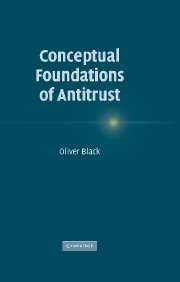
-
Select format
-
- Publisher:
- Cambridge University Press
- Publication date:
- 08 July 2009
- 03 November 2005
- ISBN:
- 9780511494666
- 9780521847957
- 9780521142076
- Dimensions:
- (228 x 152 mm)
- Weight & Pages:
- 0.497kg, 232 Pages
- Dimensions:
- (229 x 152 mm)
- Weight & Pages:
- 0.35kg, 232 Pages
- Subjects:
- Law, Competition Law, International Trade Law
You may already have access via personal or institutional login- Subjects:
- Law, Competition Law, International Trade Law
Book description
This is a philosophical study of concepts that lie at the foundation of antitrust - a body of law and policy designed to promote or protect economic competition. Topics covered are: the nature of competition; the relation between competition and welfare; the distinction between per se rules and rules of reason; agreements; concerted practices; and the spectrum from independent action to collusion. Although there are many legal and economic books on antitrust, this is the first book devoted to the philosophical scrutiny of the concepts that underpin it. No prior knowledge of philosophy is presupposed. The book is primarily directed at students, theorists and practitioners of antitrust, but will also be useful to lawyers, economists, philosophers, political scientists and others who have an interest in the discipline.
Contents
Metrics
Altmetric attention score
Full text views
Full text views help Loading metrics...
Loading metrics...
* Views captured on Cambridge Core between #date#. This data will be updated every 24 hours.
Usage data cannot currently be displayed.
Accessibility standard: Unknown
Why this information is here
This section outlines the accessibility features of this content - including support for screen readers, full keyboard navigation and high-contrast display options. This may not be relevant for you.
Accessibility Information
Accessibility compliance for the PDF of this book is currently unknown and may be updated in the future.


